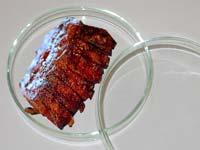B.C. summit chews on test-tube meat

With scientists perfecting the art of growing beef in the lab, the world’s first test tube hamburger will be served later this year, The Telegraph reported.
By generating strips of meat from stem cells, researchers believe they can create a product that is identical to a real burger.
But the process of culturing artificial meat in the lab is so laborious that the finished product, expected to arrive in eight months’ time, may cost about 220,000 pounds.
Mass-producing beef, pork, chicken and lamb in the lab could satisfy the growing global demand for meat - forecast to double within the next 40 years - and dramatically reduce the harm that farming does to the environment, according to the newspaper.
Last autumn Mark Post of Maastricht University in the Netherlands had grown small strips of muscle tissue from a pig’s stem cells, using a serum taken from a horse foetus.
Speaking at the American Academy for the Advancement of Science (AAAS) annual meeting in Vancouver last weekend, Post said his team has successfully replicated the process with cow cells and calf serum, bringing the first artificial burger a step closer.
Each animal would be able to produce about a million times more meat through the lab-based technique than through the traditional method of butchery, he added.
The only person to have tried the lab-grown meat so far is a Russian journalist who snatched a sample of pork during a visit to Post’s lab at Maastricht University last year and declared himself unimpressed, the Telegraph said.
Post’s aim ultimately is to invent an efficient way to produce skeletal muscle tissue in a laboratory that exactly mimics meat, and eventually replace the entire meat-animal industry.
Leave a comment









